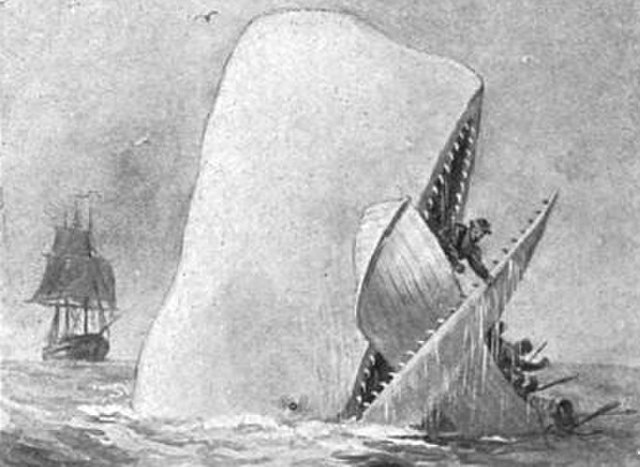Moby-Dick, or chasing the appeal of the white whale
It’s one of those iconic stories, one of the true classics of literature — Moby-Dick, in which Captain Ahab seeks revenge on the eponymous white whale and aims to hunt him to the ends of the earth. Everyone knows it, whether or not they’ve read it. So, when I embarked on my quest to be a more open-minded reader and engage with more classic literature, Herman Melville’s novel was high on the list. I read it, and it proved to be one of the more challenging reading experiences of my life.
When I told people that I was going to read Moby-Dick, the responses I received were almost all the same — that it was going to be a tough read, that it was long and frequently boring, and that I should try something else. Never a good sign. But I took the book with me to Spain (as I find flights, journeys, and the interminable airport wait the perfect place to get through the classics), and I read half of it before my return. I struggled through, and eventually got there, finally wrapping up the book on a bus ride back from campus.
I felt saddest of all when I read the boring chapters that were only descriptions of whales, because I knew that the author was just trying to save us from his own sad story, just for a little while
I was underwhelmed, to put it mildly. I’ve been pleasantly surprised by many of the classics I’ve read since beginning my quest — Treasure Island was a blast, even despite its twist now being famous, and I had great fun with Pride and Prejudice. But Moby-Dick just didn’t do it for me. I’d watched the excellent film The Whale (with Brendan Fraser turning in a heart-breaking performance) a few months prior, and Ellie’s essay in the film kept coming to mind: “I felt saddest of all when I read the boring chapters that were only descriptions of whales, because I knew that the author was just trying to save us from his own sad story, just for a little while.”
So that was that — I finished Moby-Dick, took it back to the library, crossed it off the list, and I was ready to be done with it. Or so I thought. But something lingered at the back of my mind. Moby-Dick is, we’re told, one of the greatest books ever written. It’s a classic, one that readers have flocked to in droves since its publication. I looked online on Goodreads and other reviewing sites and found a big split about the book — lots of readers shared my opinion that it was an absolute slog, while others were celebrating it for its wit, the quality of its writing, and its use of metaphor. It felt, in all honesty, like people were seeing a totally different book to me.
The actual encounter with the whale is exciting, but it feels almost like an afterthought
That’s not to say I totally hated it, I must stress. The narrator’s interactions with Queequeg are amusing and sweet in equal measure, and the scene in which Father Mapple delivers a sermon on Jonah is striking. Although Ahab is now a very famous character, there’s a great sense of build-up before we meet him, and he’s beautifully written – in one chapter, his passion for hunting the white whale turns most of the crew from sceptics to believers. But, on my first read, the good was weighed down with a lot of boring excessive material – when we take to sea, the book largely alternates between descriptions of whales and whaling, and the occasional visit to another boat on the way to Moby-Dick. The actual encounter with the whale is exciting, but it feels almost like an afterthought.
I was seeing some good, and so I decided to dig a little deeper, reading around and trying to see what the fans were seeing – after all, books don’t live on like Moby-Dick if there’s not something there to appreciate. I read a few academic articles, and I happened upon a number of guides advising readers exactly how to approach the book. I particularly liked some of Bryan Waterman’s suggestions about Moby-Dick, including thinking of it as two books in one (an adventure and a whale encyclopaedia) and looking for whatever is not a whale in the whaling chapters. I did not re-read the entire book, as I didn’t have the appetite for it, but I reflected on my memories and returned to some of the chapters I found the most frustrating. Somehow, better equipped for the fight, I found things to appreciate.
Is my opinion on Moby-Dick radically revised? I don’t think so — it’s a hard read, and I think it is unnecessarily laborious in places. I suspect, even with a better understanding of the richness of the text, I would still struggle. But I think it’s fascinating that this book had such an effect on me — I’ve seen people refer to it as dreadfully dull and the greatest American novel ever, and I can see merit in both camps. So, here’s to the many readers to come who will venture off in search of the white whale — don’t expect it to be an easy trip, though!

Comments